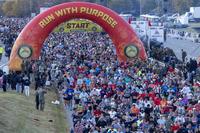Over the years, I have studied and integrated learned stress-coping skills into my life and interviewed people who are actively involved in resiliency programs and the whole trauma/stress spectrum. Finding useful tools to help build stress-coping skills will continue to be in great demand as those needing mental health care increases and those who provide much-needed assistance decreases.
With Mental Health Awareness Month in May, let's get serious and cast aside the stigma associated with seeking help.
Did You Know There is a Mental Health-Care Counselor Shortage?
We are not developing enough psychologists, psychiatrists, or mental health counselors/professionals. Between these professionals reaching retirement age, not taking new clients because of the increase in demand and our medical schools not producing enough counselors to cover those who retire, there will be many (millions) who will be neglected.
Twenty percent of Americans had some form of mental illness in 2019, a total of 51.5 million people; this was before COVID-19, when anxiety and depression increased to 40%. Studies indicate that by next year (2024), there will be a shortage of 14,000-31,000 mental health-care professionals. However, with a focus on public health by 2050, there can be a surplus. But in the next 25 years, we are operating at a deficit.
Learning Stress-Coping Skills in the Military
There is a term called "left of the boom" that is often used when teaching the spectrum of stress and trauma to our military members. Think of "the boom" as the stressor or trauma. When we talk about left of the boom, the boom and right of the boom, these three phases not only break down our understanding of life's stresses, but also help us determine appropriate training and skills for our mental, physical and emotional recovery.
Learning coping skills long before "the boom" will be a determining factor on how you get through the stressful situation and how you deal with it after it is done. From breathing skills and stress inoculation to repetitive tactical training in simulated high-stress environments, the tactical professions do well with helping our military, police and firefighters rely on the team and their training to get through "the boom."
Most importantly, we all need to practice stress-coping skills to deal with life after these stressful situations. The stress hormones created from life-or-death situations are the same when you cannot pay a bill at the end of the month or almost get into a car accident. We all can learn a thing or two when it comes to coping mechanisms.
However, practicing these coping mechanisms in a safe setting of simulated stress is difficult to replicate but beneficial to the learning curve. After this week, I think I have found a useful app that progressively introduces stress training and coping skills integrated with interesting and entertaining stories and discussions called GetMental.com. It's a tool to strengthen your mindset taught by a former Navy SEAL master chief/instructor, a writer/comedian and a neuroscience Ph.D.
Meet former Master Chief Steve Drum and comedian Jason Kyle, who recorded much of the content on the Mental app. See the full video interview on the Tactical Fitness Report with Stew Smith.
Drum joined the Navy after high school and later arrived at BUD/S for class 203 in 1995.
"After graduation, I went to the East Coast SEAL teams deploying overseas, Europe, Africa, Afghanistan, Iraq, a couple of other places," Drum said. "The last job I took in the Navy, I went to Great Lakes, which is where the Navy's boot camp is. I got tasked with creating a program called Navy Warrior Toughness. My key contribution to the U.S. Navy's Warrior Toughness Program was to take methods that SEALs use to plan, prepare and execute goals/missions and then create a framework that we could use to teach curricula centering around character development, mental skills and mindfulness training.
"We needed to equip our Navy sailors and officers with the tools they needed to succeed under the high pressure and stress of intense combat but also to deal with the day-to-day stress of military and family life," Drum said. "In the creation of the Mental app, many of these skills and practical exercises were distilled and translated for use during the cold-shower training protocols. These protocols and skills serve both warriors and everyday guys that just want to better manage stress and perform better."
Kyle, a writer/comedian with an interesting story of failures, stresses and successes, started off in the Peace Corps in Albania and found his way to Hollywood. He is now the head of creative and production at GetMental.com.
"We reached out to Steve because of his background in being an instructor, his background in creating the Warrior Toughness Program and being able to work well with the clinical psychologist and our co-founder at Mental, who is a neuroscience Ph.D. and was involved with the Calm app," Kyle said. "They focus heavily on tactical breath work and positive self-talk. That's two of our biggest things for bringing down stressors for people. There's a lot of synergy there between what we're trying to accomplish for everyday people and what Steve brought to the Navy to train sailors."
Who is this app for? This can be the person who gets cut off in traffic and needs to learn not resort to anger. That can be the person who needs to reduce his anxiety before giving a big pitch in the boardroom.
This can also be useful for anyone considering serving in the tactical professions, an operator or for those who have served. But this is not just for tactical use. In the end, it is for the everyday person who wants to learn the tools espoused in the Navy's Warrior Toughness Program and also from Navy SEAL training when it comes to bringing down stress and performing at a high level.
There is much to unwrap when dealing with the pre- and post-traumatic events inside a person's brain. While I am not a mental health-care professional, I am aware of what works for me. There is also no replacement for mental-health care, medication and counseling if you need it.
However, some skills can be taught and practiced daily to help us be more aware of our stress response and how to manage and respond to it appropriately.
More resources:
Association of American Medical Colleges
American Psychological Association (Workforce Pressures)
Calm App -- If you prefer the more meditative approach
Stew Smith is a former Navy SEAL and fitness author certified as a strength and conditioning specialist (CSCS) with the National Strength and Conditioning Association. Visit his Fitness eBook store if you're looking to start a workout program to create a healthy lifestyle. Send your fitness questions to stew@stewsmith.com.
Want to Know More About the Military?
Be sure to get the latest news about the U.S. military, as well as critical info about how to join and all the benefits of service. Subscribe to Military.com and receive customized updates delivered straight to your inbox.




















